The Domestication of Critical Theory
The Domestication of Critical Theory
Michael J. Thompson

London New York
Published by Rowman & Littlefield International, Ltd.
Unit A, Whitacre Mews, 2634 Stannary Street, London SE11 4AB
www.rowmaninternational.com
Rowman & Littlefield International, Ltd. is an affiliate of Rowman & Littlefield
4501 Forbes Boulevard, Suite 200, Lanham, Maryland 20706, USA
With additional offices in Boulder, New York, Toronto (Canada), and Plymouth (UK)
www.rowman.com
Copyright 2016 by Michael J. Thompson
All rights reserved . No part of this book may be reproduced in any form or by any electronic or mechanical means, including information storage and retrieval systems, without written permission from the publisher, except by a reviewer who may quote passages in a review.
British Library Cataloguing in Publication Data
A catalogue record for this book is available from the British Library
ISBN: HB 978-1-78348-430-0
PB 978-1-78348-431-7
Library of Congress Cataloging-in-Publication Data
Names: Thompson, Michael, 1973 author.
Title: The domestication of critical theory / Michael J. Thompson.
Description: Lanham : Rowman & Littlefield International, 2016. | Includes bibliographical references and index.
Identifiers: LCCN 2015044181 (print) | LCCN 2015048350 (ebook) | ISBN 9781783484300 (cloth : alk. paper) | ISBN 9781783484317 (pbk. : alk. paper) | ISBN 9781783484324 (electronic)
Subjects: LCSH: Critical theoryHistory20th century. | Social sciencesResearchHistory20th century.
Classification: LCC HM480 .T46 2016 (print) | LCC HM480 (ebook) | DDC 300.72dc23
LC record available at https://lccn.loc.gov/2015044181
 The paper used in this publication meets the minimum requirements of American National Standard for Information SciencesPermanence of Paper for Printed Library Materials, ANSI/NISO Z39.48-1992.
The paper used in this publication meets the minimum requirements of American National Standard for Information SciencesPermanence of Paper for Printed Library Materials, ANSI/NISO Z39.48-1992.
Printed in the United States of America
for Stephen Eric Bronner,
who taught the deeper meaning of the phrase
hic Rhodus, hic saltus
Contents
This book is put forward as a prelude to a more general project of retrieval and reconstruction of critical theory. It is essentially driven by the notion that critical theorys continued relevance can only be sustained if it is to regain its essentially critical charactercritical in the sense that it fundamentally calls into question the prevailing norms, values, and social institutions that govern society. Ever since the time of Socrates, this has been the express aim of reasoned thought oriented toward public concerns, and it seems to me that any confrontation with the affairs of modern, late capitalist societies must be informed by the kind of questions and forms of thinking that critical theory has at its core. These are needed now more than ever. The fundamental currents of postindustrial society now confront us with the prospect of an ever-growing integration of cultural and psychological patterns of the individual to the prevailing system. Conformity as well as political docility are the dominant features of our political and cultural reality. However one chooses to characterize the politics and culture of the present, there can be little doubt that it has become increasingly submissive to elite interests as well as complicit in an affirmative culture that cements the legitimacy of an irrational, destructive, and unjust social order. To be sure, the growing forces of cultural and social conformity, the submission of large swaths of the worlds population to norms and institutions governed by capital, and the increasing analytic and technical nature of contemporary philosophy and the social sciences do not inspire confidence that a new wave of critical consciousness and social change in any enlightened, progressive sense is on the horizon.
With this in mind, I believe it is crucial for critical theory to rethink its foundations and its aims. I want to urge the reader to reconsider the academicized path that has driven critical theory into what I call here a domesticated state. I want to suggest a critique of a kind of critical theory that has marginalized the more radical aims that motivated the first generation of critical theorists, who saw Marxno less than Hegel, Weber, Nietzsche, and Freudas a central figure in comprehending the dynamics of modernity, particularly the nature of power, domination, culture, and consciousness in the modern age. This is precisely what the newer generation of critical theorists has tirelessly worked against. They have elaborated new paradigms of thought that have marginalized Marxian ideas, and, as a result, they have made critical theory impotent in the face of capital and its increasing influence. What I present in the following pages is therefore meant to open a crevice in the edifice of social and political philosophy more generally as well as critical theory more specifically. This book makes no pretension at being systematic in any sense of the wordthat will be the aim of subsequent work. For now, it is important to call into question the critical bona fides of contemporary trends in critical theory and to reconstruct some of the basic aspects of what I think we should consider critical theorys distinctive logic (in addition to reconstructing in some sense its deeper, core aim of social transformation and the kinds of social pathologies that block and frustrate that essential human drive).
Such an enterprise only has value to the extent that it can help clarify the ideas of oppositional forms of thinking that are fused to a rationalist, Enlightenment conception of a rational society organized around the common interest of its members. As Hegel and Marx knew all too well, this means combatting the forces of reaction as well as the degenerate elements that have created and maintain a defective form of modernity. Critical theory persists, it can be said, only because modernity still holds out for us its own potentiality for a deeper, more satisfying form of social solidarity and individual development than our present reality can provide. The political core of this kind of critique has always been to see that the perversions of culture, of society and polity, were the result of structural inequalities of social power that enabled elite groups to reprogram those domains according to their own interests. As a social system with such a logic, capitalism must therefore be at the center of critical theorys concerns. The commodification of consciousness and the reconciliation of modern culture and politics to the prevailing system have affected a pervasive sense of conformity. It can perhaps even be said that modern culture is suffering from a severe conservatism in its basic self-understanding. No longer are we permitted, as were German Idealists, democratic socialists, avant-garde artists, and the like before us, to look at our culture as perverting the potentialities for a better, more rational form of society. No longer is there a sense of the possibility for an alternative, different course for modern society other than the present. Such a restrained mentality cannot be the animating spirit of critical theory. It is rather the stuff of a culture that can only feebly paint its gray on gray. To restore color to our world and regenerate a vision for social transformation requires a rehabilitation of the political dimension of critical theory. Reconstructing it along more humanistic, more explicitly radical lines is therefore the primary aim of this book.
Some of the following chapters are drawn from papers presented at different academic conferences and symposia over the past several years at institutions such as Columbia University; New York University; the University of Tennessee, Knoxville; Iowa State University; Uppsala University, Sweden; the John Felice Center in Rome, Italy; the School of Oriental and African Studies, University of London; Cambridge University; the Graduate Center of the City University of New York; and the Department of Philosophy at Stony Brook University. I developed some of the ideas in this book in Current Perspectives in Social Theory and Situations . Chapter 3 is based on an earlier version of a paper published in Philosophy and Social Criticism 40, no. 8 (2014): 77997, and an earlier version of chapter 6 initially appeared in the volume Reclaiming the Sane Society: Essays on Erich Fromms Thought , edited by Seyed Miri, Robert Lake, and Tricia Kress (Rotterdam: Sense Publishers, 2014), 3758. I am grateful to these publishers for allowing me to use material initially published there in this book.
Next page
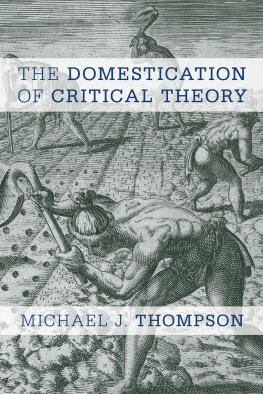






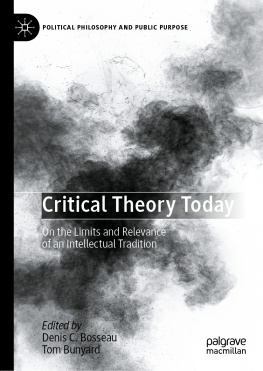
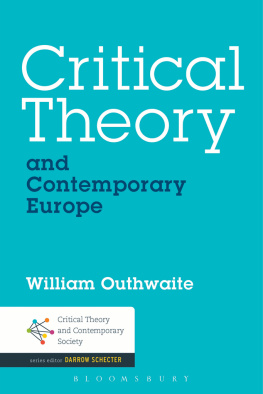
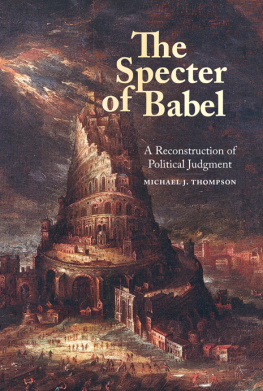
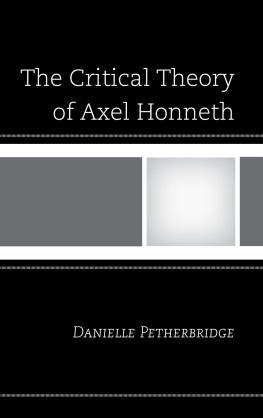
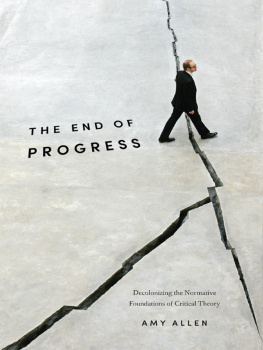
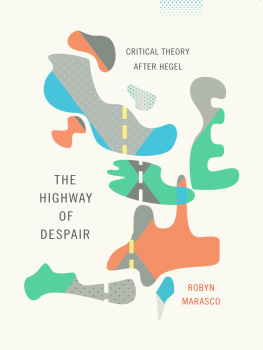
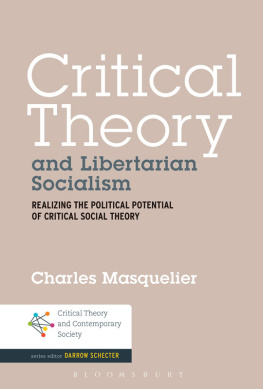

 The paper used in this publication meets the minimum requirements of American National Standard for Information SciencesPermanence of Paper for Printed Library Materials, ANSI/NISO Z39.48-1992.
The paper used in this publication meets the minimum requirements of American National Standard for Information SciencesPermanence of Paper for Printed Library Materials, ANSI/NISO Z39.48-1992.